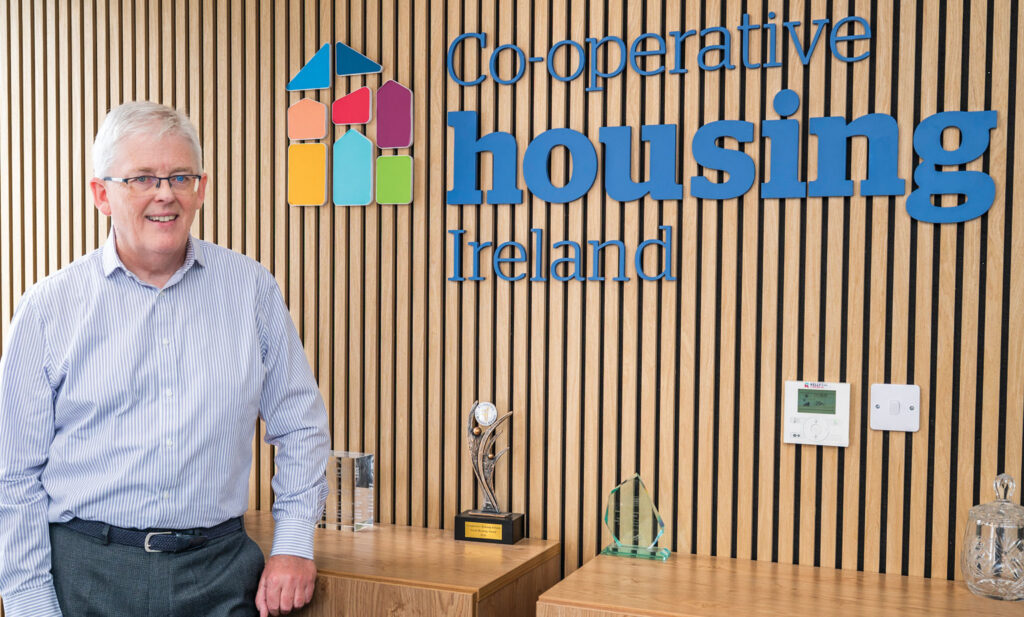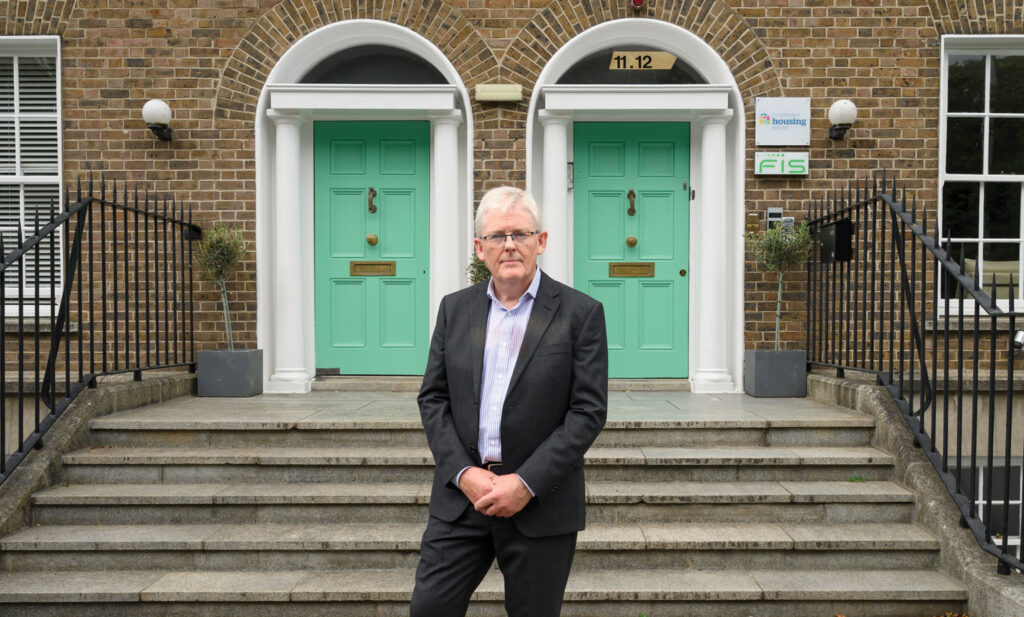
Challenges abound as government housing policy aims to accelerate delivery
1st July 2025
Housing Minister summarises government’s rental sector reform
1st July 2025Cover story: Building futures

Speaking with Housing Ireland Magazine in Co-operative Housing Ireland’s (CHI) Dublin 2 headquarters, the approved housing body’s chair, Gerry McDonogh, contextualises the legacy and impact of cooperative housing in Ireland, and its untapped potential to help solve the housing crisis.
Underpinned by a legacy of almost two centuries, Ireland’s modern cooperative housing model gathered momentum from the 1950s into the 1970s and 1980s. Amid prevailing housing shortages, local authorities provided low-cost land and accessible loans to empower working- and middle-class families to build and own homes collectively.
“This was a lifeline for those who fell outside both public housing eligibility and the affordability of the private market,” McDonogh observes.
In fact, by the 1970s, a total of 5 per cent of all homes built in the State were delivered by cooperatives. As well as establishing itself as a third branch of delivery – alongside private and public – formal support structures emerged, one of which was the National Association of Building Cooperatives (NABCo), now known as Co-operative Housing Ireland.
NABCo sought to coordinate cooperative housing across the country, advocate for supportive policies, and provide technical and administrative support. In a strategic pivot, during the 1990s and early 2000s, Co-operative Housing Ireland consolidated smaller cooperatives to scale its operations and provide long-term, affordable social rental housing.
“Today, Co-operative Housing Ireland is a leading approved housing body, providing over 6,000 social-rented homes,” its Chair outlines, adding: “Our mission is to provide homes cooperatively, work in partnership to create vibrant and sustainable communities, advocate for the delivery housing cooperatively, and support cooperative and community-led housing initiatives.”
A distinct characteristic of Co-operative Housing Ireland’s work is member democracy. This means that member tenants are not “passive recipients of housing” but are active members of local co-operatives.
“They contribute to governance, participate in decision-making, and help shape the character of their communities,” explains McDonogh.
“This democratic ethos remains a cornerstone of Co-operative Housing Ireland’s identity.”
“Cooperatives do not merely build homes, they build futures.”
Gerry McDonogh, Chairperson, Co-operative Housing Ireland
Tenant impact
Providing more than ‘bricks and mortar’, as relayed by McDonogh, the raison d’être of housing cooperatives in Ireland is to “offer security of tenure, affordability, and social capital through participation and mutual support” while “fostering a culture of care and stewardship”.
“Many of Co-operative Housing Ireland’s member tenants emphasise the transformative opportunities opened to them following their move into cooperative housing. For example, the transition to stable, high-quality homes has opened doors to employment, education, and better health outcomes, emphasising the fundamental link between housing and personal and community development.”
“Cooperative housing models elsewhere in Europe can provide the legal, financial, and planning frameworks that nurture cooperative growth.”
Potential
However, after reaching its apex in the 1970s, cooperative housing has declined to its nadir and now represents less than 1 per cent of total housing delivery. This decline, the CHI Chair notes, is linked to policy trends, changes in the lending practices of banks and building societies, and an increased reliance on market-led solutions.
Amid the housing crisis, the cost of housing has increased by 115 per cent in a decade according to Society of Chartered Surveyors Ireland (SCSI) figures. As such, homeownership has again become “unattainable for a significant number of households”.
In this context, McDonogh believes that the potential for a resurgence in cooperative housing is “very real” and that it “should be central” to meeting needs across social, cost rental, and homeownership sectors. In addition to supporting the Housing Commission’s recommendation that 20 per cent of national housing stock be social and affordable rental homes, the co-operative model would also deliver greater affordability for homeowners.
“While Co-operative Housing Ireland’s focus has been on the delivery of social-rental history shows us the potential of the model to provide affordable homes across all tenure types.
“The Report of The Housing Commission highlights the role of AHBs, such as Co-operative Housing Ireland, as critical partners in building an inclusive, sustainable housing system.
“Co-operative Housing Ireland’s ability to deliver long-term affordability, stability, and tenant participation makes us uniquely suited to the State’s current housing environment,” he says.
Simultaneously, McDonogh identifies a renewed interest in the Community Land Trust (CLT) model whereby land is held in perpetual community ownership, decoupling it from market value.
“This model often complements cooperative housing, securing multigenerational affordability and aligning closely with values of collective ownership and stewardship. With appropriate incentives and support, cooperative housing could again play a transformative role in meeting the country’s housing demand,” he observes.
Exemplars
Identifying Switzerland, Germany, and the Netherlands as exemplars of housing systems with significant elements of cooperative and community-led housing, the CHI Chair suggests that there are transferable lessons for Ireland.
“Cooperative housing models elsewhere in Europe can provide the legal, financial, and planning frameworks that nurture cooperative growth,” he says.
“In Zurich, for example, almost one-third of all homes are cooperatively owned or managed. This is underpinned by robust municipal policies and access to affordable finance. Meanwhile, Germany’s Baugruppen demonstrate how resident-led development can yield high-quality, sustainable, and inclusive housing.”
Sustainability
Reflecting its commitment to environmental responsibility and a recognition that sustainable homes contribute to enhance quality of life, sustainability is now at the core of Co-operative Housing Ireland’s work.
Launched in 2022, the Improving Warmth and Wellbeing programme, Co-operative Housing Ireland’s flagship initiative, aims to deep energy retrofit 216 homes up to a minimum BER A3 rating.
“Delivered in partnership with the Sustainable Energy Authority of Ireland (SEAI), Improving Warmth and Wellbeing programme is about more than kilowatt-hours. Rather, it is about affording wellbeing and dignity to households impacted by fuel poverty. Households comprising older people and children have reported immediate improvements in comfort, health, and wellbeing,” McDonogh emphasises.
Co-operative Housing Ireland recognises member tenants as partners, not just beneficiaries. As such, a key tenet of its retrofitting initiative is tenant engagement that seeks to actively involve residents from the beginning of the process to its completion, whether via pre-works consultation, workshops on energy use and new technologies, or aftercare and support services.
“This model has ensured that retrofits are both technically and socially successful and our work has been recognised through several industry awards, including the Striving for Sustainability Award (2025), the Net Zero in Housing Award (2023), and Retrofitting Project of the Year (2022),” the Chair notes.
Advocacy
Co-operative Housing Ireland’s advocacy work ranges from highlighting the need for increased funding in the not-for-profit housing sector to address current and legacy funding shortfalls, to outlining a legislative and policy framework to unlock the benefits of cooperative and community led housing.
However, while McDonogh emphasises the success of those working to promote the housing cooperative model as demonstrated by the inclusion cooperative and community land trusts in the Affordable Housing Act 2021, he acknowledges: “We are still waiting for the necessary policies to make this a reality.”
Ambition
In summary, the Co-operative Housing Ireland Chair reiterates that while the cooperative model has a legacy of housing delivering Ireland, its potential remains untapped.
“Rooted in values of community, democracy, sustainability, and solidarity, the cooperative model offers a solution to the housing crisis that meets both material and social needs.
“Now is the opportunity to replicate successes of the past. With strong State backing, clear legislative support, and equitable access to finance and land, cooperatives can once again reach their potential. Cooperatives do not merely build homes, they build futures. In this time of crisis, that is exactly what Ireland needs.”



